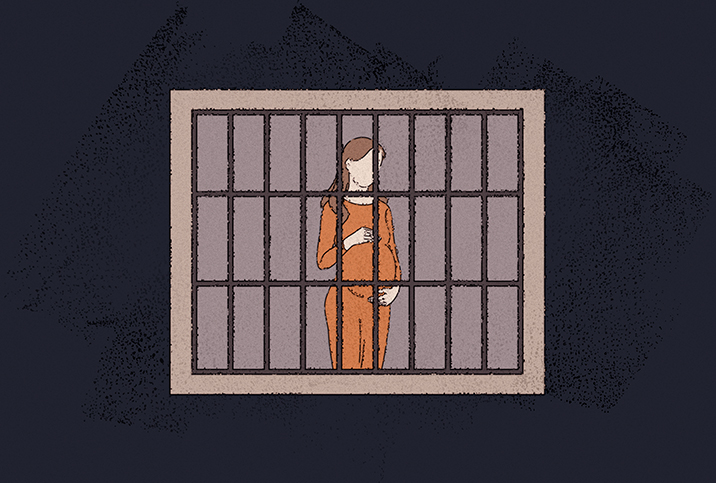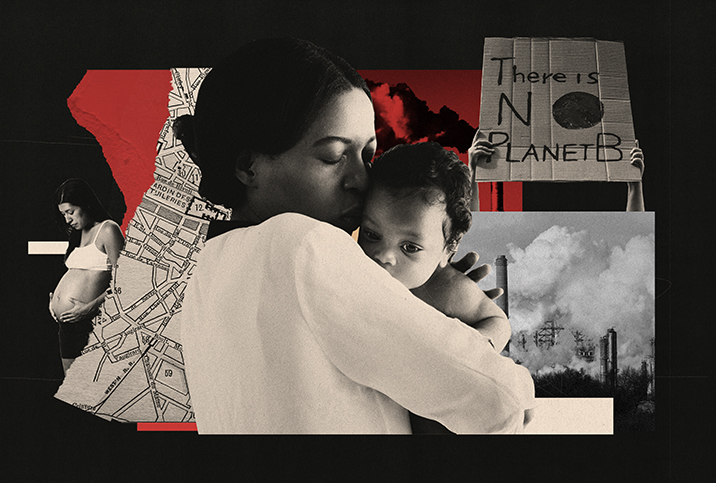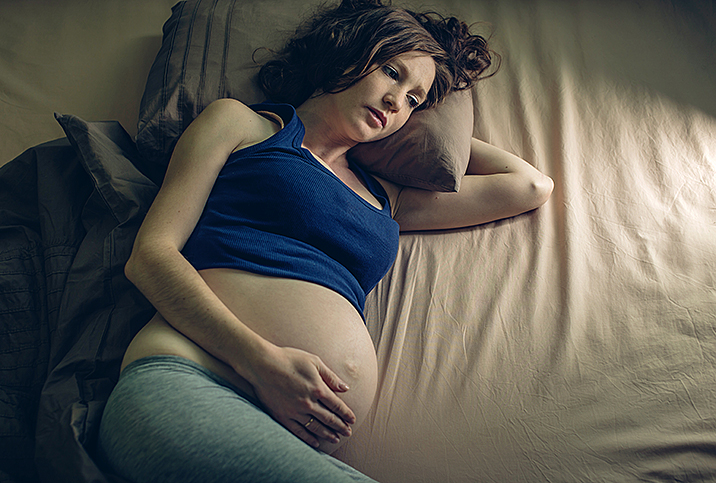Incarcerated Pregnant Women Face Healthcare Challenges

An estimated 58,000 pregnant individuals pass through prisons and jails each year, some giving birth while in correctional facilities. Despite these numbers, there is no set of standards for the care of incarcerated pregnant women.
"We don't have a standard of care we can hold carceral facilities accountable to uphold," said Amy Ard, executive director of Motherhood Beyond Bars, an Atlanta-based nonprofit organization that provides support for infants of incarcerated mothers, and pregnancy and postpartum education.
"That means that wardens, prison clinicians and individual correctional officers get to make it up as they go along, often with absolutely no training or understanding of evidence-based best practices for pregnant people," Ard stated.
"We suspect, based on the reports we receive from incarcerated women and their families, that quite a few have poorly managed care," she said.
Pregnancy outcomes in prison
Due to the lack of standardization of care, pregnancy outcomes are highly variable, explained Carolyn Sufrin, M.D., Ph.D., an OB-GYN and associate professor at Johns Hopkins School of Medicine in Baltimore.
"It's hard to have a uniform story about what's happening with pregnancies in prisons, because it varies from state to state and even within states," Sufrin said.
Sufrin spearheaded the Pregnancy in Prison Statistics (PIPS) study, which is the first and, to date, only systematic study of pregnancy outcomes of incarcerated individuals nationally. The study collected data from 2016 to 2017 from 22 state prison systems, the Federal Bureau of Prisons, six jails and three juvenile justice systems, representing 57 percent of women in prison and 5 percent of women in jail.
Though the words jail and prison are often used interchangeably, they are different types of facilities. A jail is a local, short-term facility for people who are newly arrested, currently awaiting trial or sentencing, or being held for minor crimes and serving a sentence of generally less than a year. A prison is a state or federal long-term facility for people convicted of serious crimes. Some prisons are privately operated, and though they are under contract with a state, the state does not have as much control of these facilities as state-run facilities.
The data collected in the PIPS study illuminated the state of pregnancy in the carceral system, looking at various factors that contribute to the pregnancy experience and outcomes.
Miscarriage
Miscarriage rates varied depending on the state; some were higher and some were lower than the national average.
In certain states, such as Arizona, Kansas and Minnesota, the miscarriage rates while in custody ranged from 19 percent to 22 percent, exceeding the national rate of 10 percent to 15 percent. Some of these numbers could be due, in part, to higher rates of incarceration for women in certain states.
Sufrin explained that miscarriage rates in some prisons may have been lower than the national average because people tend to get to prison later in their pregnancy, rather than to jail, and most miscarriages happen in the first trimester.
Sufrin also noted in the study that "rates of miscarriage and other pregnancy outcomes in custody are not exactly comparable to the general population's rates because they only refer to outcomes that took place during incarceration." Women who were released while pregnant may have had their outcomes impacted by incarceration, but the PIPS study doesn't cover that aspect.
Abortion
One salient finding from the surveyed prison facilities was that over a one-year period, there were only 11 abortions.
"I think that's very telling, given that there were 753 births that happened. So only about 1 percent of the pregnancies that ended in prison ended in abortion, which is much lower than what we would expect," Sufrin said.
A 2021 Guttmacher Institute study on abortion access in prison found that of the 22 prisons studied, 19 permitted abortion, but two-thirds required the women to pay for the procedure. So while the majority of prisons may allow abortion, restrictions can make access to the procedure difficult.
Breastfeeding
The PIPS study indicated there was varied access to breastfeeding, which has been linked to lower risks for postpartum depression and myriad other health benefits for infant and mother. There was inconsistent implementation of breastfeeding policies in both prisons and jails. Among the prisons with lactation policies, only eight of the 207 women who had given birth in prison during a six-month period breastfed.
Shackling pregnant patients
A 2019 article published in the Journal of Obstetric, Gynecological & Neonatal Nursing found 82.9 percent of perinatal nurses reported that their incarcerated patients were shackled "sometimes to all of the time."
Shackling poses dangers to the birthing parent. NPR reports that at least 37 states have limited the shackling of incarcerated pregnant individuals, but these limits aren't always consistent. Shackling is rarely necessary; the majority of women in prison are incarcerated for nonviolent crimes and drug-related crimes.
The long-lasting impact
Going through pregnancy behind bars creates long-lasting emotional effects. Unsurprisingly, studies link incarceration with lingering negative mental health impacts. Birthing parents might face increased stress and anxiety about birth due to a lack of control over their environment. There are high levels of postpartum depression while mothers are incarcerated, according to a 2021 study published in the Journal of Midwifery & Women's Health.
After delivery, some birthing parents take care of their infants in prison nurseries while incarcerated for up to one year. But Sufrin's research shows that the majority of infants go to a designated family member or are more likely to go to foster care than stay with their mothers.
"No matter what the experience of giving birth while in custody, having to be separated from your newborn after birth is a traumatizing experience," Sufrin said.
Policies for improving care
Ard said the first step to creating change in the carceral system is obtaining adequate data.
"There's no way for us to advocate for better treatment or more monitoring if we can't point to a specific problem. We don't even know how many pregnant women are in Georgia's jails; no one even collects data on the numbers of women, much less what their pregnancy outcomes are," Ard said.
"We need a system that requires that certain standard healthcare services are required and that come with a system of oversight and accountability," Sufrin added.
In Minnesota, the Healthy Start Act allows the commissioner of corrections to place pregnant or postpartum women into community alternatives. They are provided with treatment for their pregnancy and up to one year of the postpartum period, allowing the child to be near their mother for the first year.
The Healthy Start Act also enables people to access their health insurance or Medicaid if they are eligible. Due to an exclusionary clause in Medicaid, federal law prohibits incarcerated individuals from getting Medicaid while in custody, and most prisons charge incarcerated individuals copays for health care.
"If that clause were eliminated and prisons and jails could rely on Medicaid to cover healthcare costs, they would have more incentive to provide comprehensive care because they know they'd be reimbursed," Sufrin said.
The American College of Obstetricians and Gynecologists (ACOG) has a list of recommendations for improving health care for incarcerated pregnant people. These recommendations are for gynecologists and other healthcare professionals to support efforts through the following:
- Working inside the carceral system to provide medical care for inmates and training for prison clinicians and correctional officers
- Creating a healthcare system to provide care after release
- Advising detention centers, jails and prisons on guidelines and protocols that ensure reproductive health care, pregnancy care and postpartum care is provided to inmates
- Advocating for the elimination of copays and shackling, and the availability of menstrual products
- Ensuring medical providers at hospitals and clinics are providing incarcerated patients with compassionate, appropriate care
- Advocating for data collection on incarcerated pregnant people
Sufrin said the most impactful change for pregnant people in the carceral system would be not to incarcerate them in the first place.
"But until that time comes, we need to make sure that pregnant people behind bars are getting the full care that they need, and in a respectable manner and in ways that value their motherhood," she said. "Even when people do get, on paper, what appears to be the right prenatal care services, it's not necessarily always delivered in the most respectful way."
Abortion is a medical procedure that is currently illegal or restricted in some portions of the United States. For more information about the legality of abortion in your area, please consult a local healthcare provider.

















